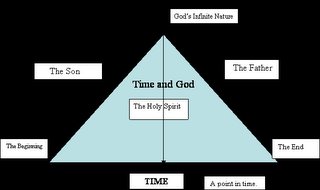Some thoughts on free will and determinism: God exists eternally. He has existed in eternity past and eternity future. As he exists now, perhaps he cannot know the future, but as he exists in the future, he knows all that has happened in the past. As he is infinite, he cannot be divided. This is unlike ourselves who, since we are not aware of our simultaneous existence in the past, present, and future, seem to be divided between them. Since God is in the present, by definition, he can only know the present. Since he’s in the past, by definition, he has determined what he wants to happen, but he cannot know for sure what will happen. Since he’s in the future, by definition, he knows all things that have ever happened. Actually, there is no future for God, only a past and a present.
I’m not sure that I‘ve stated myself clearly, but what I tried to say is that he knows what will happen because he knows what has happened. Our free will, though, is maintained because for us, the future has not happened yet. And that, perhaps, is literally true. Perhaps, the future does and does not exist at the same time. I think that God would have to somehow exist in time to know the present and future.
It’s possible that my idea is not original. I know that others have suggested that God experiences time as an ‘eternal now.’ Not everyone agrees with that notion. I shall give it more thought.
10:05pm—Perhaps past, present, and future are not all the same for God. Maybe time has a ‘Trinitarian’ structure—they are all almost exactly the same—but not quite. Are they intrinsically different, or only different because God has differences within himself?
I’m not sure I know what I mean by that. Are the three perspectives merely apparent and not real? I suspect they are real, just as the three degrees of space, length, depth & width, are true. One point in space can be described from each of these three perspectives. So, since time and space are bound together as ‘space-time,’ both can be seen from each of their three perspectives. Maybe (I hesitate to write with certainty here) space and time are not analogies describing God’s attributes, but do infact model aspects of God. Maybe they are even aspects of God themselves.
Perhaps my idea is not the same as the ‘eternal now’ concept. The ‘eternal now’ concept says that God exists outside of time, and therefore sees the past, present, and future all at once. But he perhaps exists in time, possibly another dimension of it; maybe it’s an aspect of him, as I previously suggested. If so, then he possibly actually experiences the past, present, and future. He wouldn’t necessarily experience the passing of time. He would simply, being fully in each moment in time, be aware of what is happening at any given moment, plan for what may happen in the next moment, and remember what happened in the previous moment.
Well, what does this have to do with predestination and free will? Here’s my thinking: In one respect, since he can see into the past from the future, he knows how the future will go, and he can make sure it comes out the way he wants. But, in another respect, he can’t know how it will go, he can only set up existence to go as he would like, but he can’t actually know if it will go that way. In the middle, where the past and future meet, is where we stand. We stand in the present, and nowhere else. It seems possible that though he does intervene at certain points, he largely gives us and the universe he created the chance to behave as we please. So, then he would not be able to predict our behavior but he would still be able see our behavior from his perspective in the future.

No comments:
Post a Comment